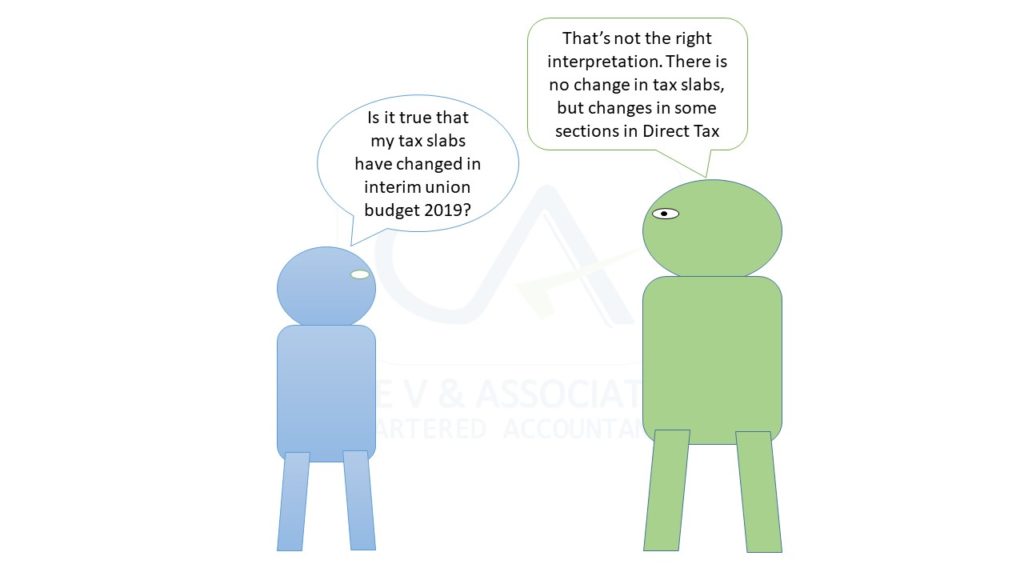I was closely following the interim Union Budget 2019 presentation of Piyush Goyal, as it’s my responsibility as a Chartered Accountant to apprise the impact on my clients. However soon after the minister presented the reforms in Direct Tax category, there were multiple wrong interpretations presented by the television channels and hence this blog. Understand the reality before you make your plans.
My reference for this blog is the Finance Bill 2019 presented in Lok Sabha on 1 February 2019.
Finance Bill presented by the Minister is tabled in Lok Sabha for discussion and the final version after discussions and amendments, if any, will be available later. However under normal circumstances, one cannot expect substantial changes, especially for Direct Tax changes.
Changes in Direct Tax
No changes in Direct Tax slabs or rates for Financial Year 2019-20 – The current slabs and tax rates will remain.
| Income Slab Min Value | Income Slab Max Value | Tax Rate |
| 0 | 2,50,000 | 0% |
| 2,50,000 | 5,00,000 | 5% |
| 5,00,000 | 10,00,000 | 20% |
| 10,00,000 | 30% |
Change in tax rebate under Sec 87A – Tax rebate, applicable for all resident individuals, is changed as follows
For total income less than 5 Lakhs, full tax rebate (maximum Rs. 12,500) will be provided from financial year 2019-20, as opposed to the rebate of maximum Rs.2500 for total income less than 3.5 Lakhs. Impact of this change is described with calculations in the next section.
Change in Standard Deduction under Sec 16 – Standard deductions applicable for salaried individuals is increased to Rs.50,000 from Rs.40,000 available currently.
Only major changes that affect salaried class is given above. Rest is listed in subsequent sections.
Impact on You
Impact on your net
- Standard deduction change – This is applicable across all salaried class
- Full Tax rebate for resident individuals with income less than Rs.5 Lakhs
These changes are illustrated via tax calculation for two scenarios in the below table.

The catch here is that if your Total Income (taxable income) is more than Rs.5 Lakh, then you won’t get any benefit of this rebate. So if your income is Rs.5,00,000 then you don’t have to pay any tax. But if its Rs.5,00,001 then you need to pay full tax as before (except for the benefit of the increased standard deduction).
Other Changes that could affect You
Change in tax calculation if you have two self occupied houses – No taxability on
Change in Bank TDS limit under Sec 194A – Banks will deduct TDS on the interest earned from deposits only if it crosses Rs.40,000, as opposed to Rs.10,000 as applicable currently.
Change in TDS limit on Rent under Sec 194I – TDS compliance is applicable
Changes in Capital Gains rules on selling and buying
Since basic tax exemption limit still remains at Rs.2.5 Lakh, anyone above that limit will need to file IT returns as before. So if your taxable income is Rs.5 Lakh – you’ll not have any tax to pay, but will need to file IT returns as before.

